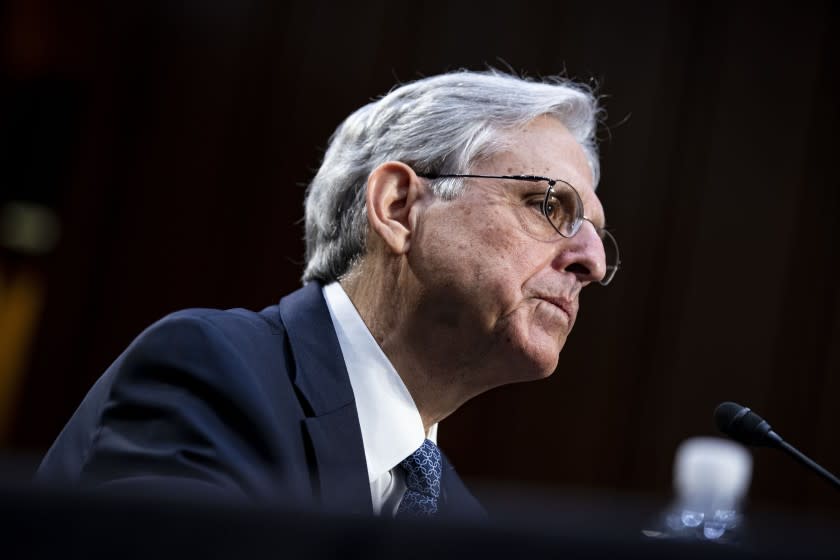Litman: Garland's vow can eradicate Trump's corruption of the Justice Department

- Oops!Something went wrong.Please try again later.
- Oops!Something went wrong.Please try again later.
After four years of the Trump administration running roughshod over evenhanded, apolitical law enforcement at the Department of Justice, there is an understandable desire to strengthen constraints on the presidency through legislation or regulation. A former White House counsel and a former assistant attorney general, Bob Bauer and Jack Goldsmith, have written a whole book — "After Trump" — proposing guardrails to put into place.
Merrick Garland, who may be confirmed as the nation’s next attorney general as early as this week, signaled a different approach during his confirmation hearings. Instead of calling for a formalized, legislated code of conduct governing the relationship between the White House and the Justice Department, Garland invoked the norms that were taken for granted before Trump decided he had an “absolute right to do what I want to do with the Justice Department.”
Garland, of course, imbibed the department's norms in his years as federal prosecutor and a deputy assistant attorney general. On Monday, he explained them as “policies that protect the independence of the department from partisan influence in law-enforcement investigations; that strictly regulate communications with the White House; … that respect the professionalism of DOJ employees; and that set out the principles of federal prosecution to guide the exercise of prosecutorial discretion.”
Perhaps the most notable of these principles is this one: There is to be no communication between the White House and the department with respect to pending cases, except in narrowly drawn circumstances between a small subset of officials (the deputy attorney general and the White House counsel). The general way this works actually exists in writing, but only in letter form — nothing more formal than that — and before Trump and his various attorneys general, that’s all it took to effectively separate the president from misusing the massive investigative and prosecutorial power of the Department of Justice.
Garland clearly believes it should be enough to pledge fealty again to these principles, without a need to set the norms in stone. As he told the Judiciary Committee, he insisted on President Biden’s support for the department’s independence as a condition of accepting the nomination. And Biden underlined that it was his view too: "Your loyalty isn't to me," he told Garland as he announced his nomination. "It's to the law, the Constitution, the people of this nation."
Garland, mild-mannered, still conveyed steely independence in the hearings: “I do not plan to be interfered with by anyone,” he said. Were he faced with a compromise of that principle, he said he would resign rather than accept it. As a former federal prosecutor, I could almost hear the cheers and high-fives from the department’s headquarters at 9th Street and Pennsylvania Avenue.
And yet. Norms and statements of principle by their nature are less binding than codified laws and regulations. Garland’s traditional approach to the Justice Department’s role isn’t a guarantee against the next wannabe tyrant who finds a way into the White House. Nonetheless, Garland’s way is the smart way to revive the department today, and in the end it is probably the only way to do it.
For starters, the idea that we could legislate a way to prevent Trump’s manifold corruptions is chimerical. Putting a principle like the necessary independence of the Justice Department into statutory language would be notoriously difficult and an invitation to unintended consequences. The laws regulating special counsels or independent prosecutors are a good example. There have been two attempts at specifically defining this insider/outsider role. The result either gave the prosecutor too much power (think Kenneth Starr’s boundless investigation of President Clinton) or too little (Atty. Gen. William Barr was able to ultimately control the message of Robert S. Mueller III’s Russia-2016 election investigation).
I think Garland may also think, rightly, that it is odd to look to the Department of Justice, which represents the executive branch, to champion legally binding reductions of executive power. In administrations of both parties, the Justice Department has seen its role as protecting an expansive view of executive power while employing prosecutorial discretion to erect voluntary guardrails when needed.
There is one final reason why Garland’s reassertion of norms, rather than a legislated code of conduct, is the most appropriate way to revive the honor of the Justice Department. It is far from clear that giving the force of law to, say, the principle of Justice Department independence from White House political pressure would actually deter another Donald Trump. He is now facing a post-tenure minefield of civil and criminal investigations, but while he was president, Trump trampled constitutional commands, statutes, regulations and norms with equal indifference.
Garland’s reliance on norms fits an irreducible reality. Our government relies on the character of the people we put in positions of power. An attorney general who can’t or won’t stand up to improper political pressure on the strength of his own honor and integrity (undergirded by a willingness to resign rather than corrupt the department’s basic function) won’t be much strengthened by a new law in the U.S. code.
Garland promised this week that on his watch, the Justice Department “will be under my protection for the purpose of preventing any kind of partisan or other improper motive in making any kind of investigation or prosecution.”
“That’s my vow,” he said.
With Garland, and in the immediate aftermath of the Trump catastrophe, that's good enough.
@Harry Litman
This story originally appeared in Los Angeles Times.

